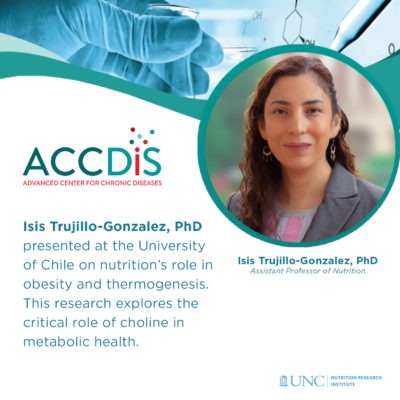On March 14, Isis Trujillo-Gonzalez, PhD, an Assistant Professor of Nutrition at the UNC Nutrition Research Institute (NRI) shared a presentation titled, “Beyond Macronutrients: The Influence of Dietary Choline on Obesity and Thermogenic Regulation” at the Advanced Center for Chronic Diseases (ACCDiS) located within the University of Chile. The invitation to this 10-year anniversary celebration marked a significant milestone following a year-long collaborative research effort with ACCDiS Director Sergio Lavandero, PhD, focusing on metabolic diseases and nutritional health.
The collaboration between Trujillo-Gonzalez and Lavandero highlights the ongoing global effort within scientific communities to address chronic disease through nutrition. ACCDiS is recognized for its research on chronic disease prevention and management, and the anniversary event provided an opportunity to showcase important advancements emerging from international scientific partnerships.
Trujillo discussed the often-overlooked role of micronutrients in maintaining optimal health. Emphasizing the challenges posed by modern diets, she discussed how high-calorie, ultra-processed foods frequently lack essential nutrients such as choline, potentially contributing to metabolic disorders.
“Choline is essential for several bodily functions, including neurotransmission, gene expression, and cellular integrity,” states Trujillo-Gonzalez. She continues, “When an adequate amount is not found in the diet, these functions suffer.”
Her presentation featured preliminary data from a joint study between the Trujillo-Gonzalez and Hursting labs, led by Evan Paules, PhD. His research looks at how different amounts of choline affect the body’s response to a high-fat, obesogenic diet, helping researchers understand how low levels of important nutrients might impact health.
Paules explains, “We’ve long known that genetics, diet, and physical activity influence obesity, but there’s growing evidence that chemical compounds called obesogens also play a major role. These disrupt how the body handles metabolism and fat storage, contributing to weight gain.”
💡 What is an obesogenic diet?
While genetics, diet, and physical activity have long been known to influence obesity, growing evidence points to the role of obesogens as a significant factor. Obesogens are chemical compounds that disrupt normal metabolism and fat storage processes in the body, causing obesity. An obesogenic diet is high in these, and typically features high amounts of calories, sugars, fats, and highly processed foods and often lacks essential nutrients. Common obesogens found in highly processed foods include bisphenol A (BPA), phthalates, and certain artificial sweeteners, all of which can alter the body’s hormonal regulation and promote fat accumulation.
Trujillo-Gonzalez shared key findings from previous research, demonstrating how disruptions in choline metabolism – specifically involving the enzyme betaine homocysteine methyltransferase (BHMT) – can significantly affect fat tissue function and energy balance. The results show the potential benefits of choline-rich diets in preventing obesity and obesity-related metabolic conditions.
Trujillo-Gonzalez reflected, “It was a great opportunity to exchange ideas and share some of the work we’ve been doing at the NRI on dietary choline and metabolism. Collaborations like this help us see how our research connects with broader global health challenges.”
The ACCDiS’s 10th anniversary event fostered engaging dialogue among experts in the field. As studies like those led by Trujillo-Gonzalez progress, new findings may help guide how we think about the relationship between nutrition and long-term metabolic health and spark questions that lead to future scientific discoveries.

